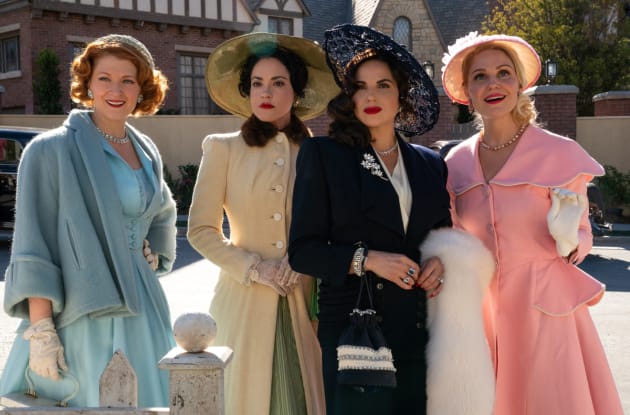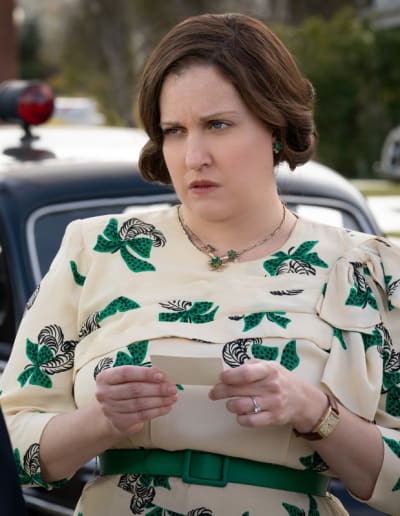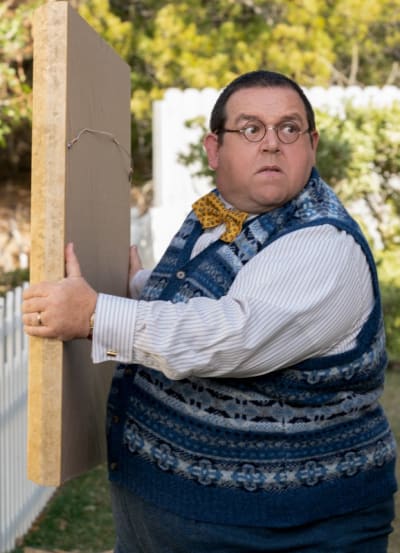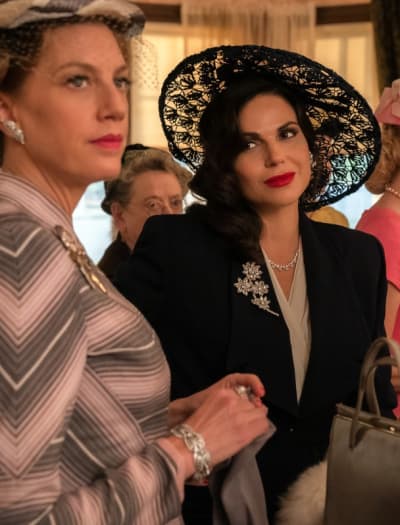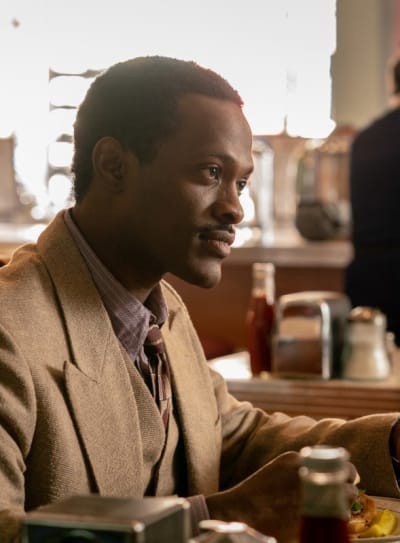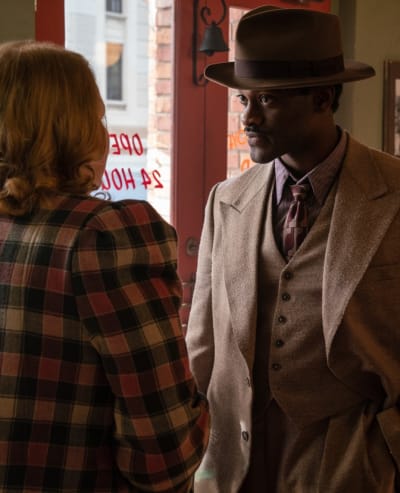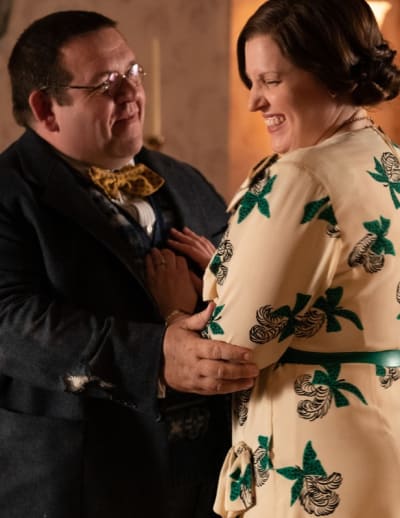Alma has a lot of issues, but she managed to raise a helluva daughter.
We’ve seen this all along, but with Why Women Kill Season 2 Episode 4, the contrast between mother and daughter stands out.
Dee is Alma’s antithesis, and she’s got a line on a much happier life as a result.
Alma wants to be someone else. She feels desperately average, unseen, and unsatisfied.
There are many reasons for it, but the most significant is her lack of confidence. She’s never gone outside of her comfort zone to find happiness. At least, she didn’t until Dee prodded her to take the chance after the death of a high-profile garden club member.
Since she’s lived such a sheltered existence, Alma sees things through rose-colored lenses. She idolizes the women of the garden club, Rita especially, and honestly believed that the garden club was a manifestation of their love for nature.
Speaking of nails, how do you ladies keep your hands so lovely and tend to your gardens? Mine are just a fright from all the weeding and thorns. [the ladies burst into giggles]
Alma
Unfortunately, even with this new zeal that she has to get what she wants, she’s on the wrong path to make it happen.
Bertram’s secret life can’t have helped. It’s incredibly exciting, sure, especially from the outside. Alma has clearly discovered a side of herself she didn’t know existed merely by being let in on Bertram’s secret (which he clearly is not ready to go of quite yet).
But she is also eager to achieve her goals dishonestly, latching onto Mrs. Yost’s life as her own to do it.
I can’t blame Alma for taking portions of Mrs. Yost’s life as her own. Desperation makes people do strange things. She believes the life she wants is within her grasp if only she masquerades as someone else.
Bertram: That’s your excuse to steal? To impress a bunch of snobs?
Alma: Bertram, if you will help me through this very trying day, I promise I will stop complaining about all those people you killed. Think about it. From this moment on, we’ll be even.
Bertram: What a lovely vase.
And it works like a charm. Of course, it does. Alma is acting a role, losing herself in the process. Nothing about the garden club ladies screams peace and happiness. They’re snooty, bitchy, and they have no problem stabbing each other in the back.
Still, Alma is willing to risk anything to become a part of their group.
Rita saw through Alma’s facade, and when the two shared a conversation in the kitchen, that was the closest they’ll ever get to honesty with each other.
Rita needed to hear she was envied as much as Alma needs to be accepted. Alma’s view of Rita is the woman Rita wants to be. It’s too bad that Alma can’t see how Rita’s struggling.
Bertram: Why do you want to join a club you can only get into by pretending to be someone you’re not?
Alma: This painting may not be who I am, but it’s who I yearn to be! It’s a healthier dream than some I could mention.
Rita’s life is collapsing around her feet. If Alma is trying to gain access to her world through lies, Rita has no right to judge. She’s living a carefully crafted life of lies that falls apart under scrutiny.
Catherine is breathing down her neck, and she’s losing control over Scooter. If she’s not careful, Scooter will hitch his future to Catherine instead of Rita, and then where will she be?
Scooter: You’re still trying to get me in bed with Carlo’s daughter?
Rita: If you can pretend to be interested in a fat girl, you can fake a bit of passion for a middle-aged woman.
Scooter: I never faked it with you, baby!
The garden club’s home welfare check on Alma was fruitful and almost laid bare Alma and Bertram’s deepest, darkest secret. But it seems like Rita would have appreciated the effort, buried body and all, far more than she did the discovery that Scooter’s other woman is Alma’s daughter.
That will tear down Alma’s forward momentum.
It’s too bad since Dee has moved on from Scooter. It was going to happen eventually.
She’s too bright to sink too deep into a shallow and callous relationship, even if Scooter does look like a movie star.
Scooter didn’t seem all that bad when he was at his lowest, begging for money from a waitress that he wouldn’t even let in out of the rain. Dee’s heart couldn’t let him suffer, and that struck Scooter right where it needed to.
He knew he was useless and unkind in his dealings with her. Freeing her gave Dee the courage to move on to the man who trumps Scooter in every way.
Dee has confidence to spare. She sees something in Vern, and more importantly, in how she and Vern have connected.
Vern didn’t know what hit him. She asked him to lunch and declared herself his girl after successfully saving them both from one of Vern’s mad (in both senses of the word) clients.
Vern’s got secrets, too. His time away at war left him physically scarred, and his return home left him mentally scarred. Vern lost his faith in love when he got dumped for his war injuries.
But Vern has never met anyone like Dee. Since she was all about Scooter’s good looks, Vern probably thought his plight would be a turnoff for Dee, too.
Just because Dee wanted a turn at superficial sex doesn’t mean she doesn’t yearn for a deeper connection. If all goes well, Rita’s insecurities will lead them to a relationship they can treasure.
In the Why Women Kill Season 2 Episode 3 review, I said that Vern offered the viewer’s perspective of the story as it unfolds, and it seems we can add Dee to that, as well.
Now that Rita knows that Dee is connected to Alma, we can expect things to go from dazzling to depressing for Alma, and Dee and Vern will be pulled into that tide, too.
And as if that’s not enough, the walls are closing in on Alma and Bertram.
As we thought, their sour moods and mistakes at the crime scene left the door wide open to foul play, and one of Vern’s pals is on the case.
Will Vern’s relationship with Dee offer some assistance?
It’s an option.
Their crime spree has brought Alma and Bertram closer together, but she’s in a state of euphoria that leaves her open to intense scrutiny. T
hat’s not good for their Mrs. Yost situation or Bertram’s seemingly unending need to put people out of the misery he perceives on their behalf.
Although this dramedy plays a lot for laughs, the emotional wounds and societal scars make this a story worth the investment.
Are you watching? I’d love to hear from you!
Carissa Pavlica is the managing editor and a staff writer and critic for TV Fanatic. She’s a member of the Critic’s Choice Association, enjoys mentoring writers, conversing with cats, and passionately discussing the nuances of television and film with anyone who will listen. Follow her on Twitter and email her here at TV Fanatic.
